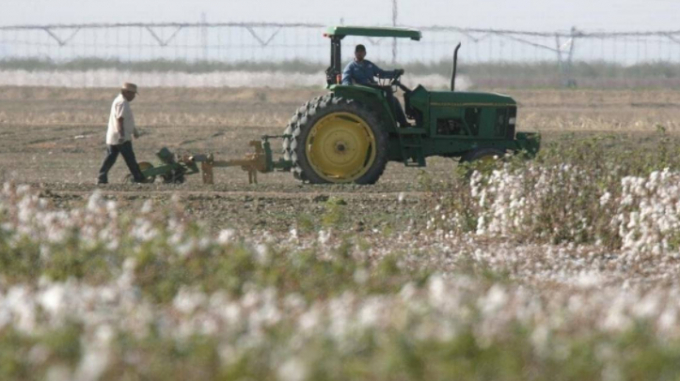November 28, 2025 | 04:46 GMT +7
November 28, 2025 | 04:46 GMT +7
Hotline: 0913.378.918
November 28, 2025 | 04:46 GMT +7
Hotline: 0913.378.918

Farmers in the agriculture-rich central San Joaquin Valley _ Fresno, Kings, Madera, Merced and Tulare counties _ are among the top producers in the nation. Photo: JW
It’s an extraordinary step — and one that regulators didn’t take during the last drought, which was considered one of the worst on record.
The State Water Resources Control Board on Friday released an “emergency curtailment” order that would cut thousands off from rivers and streams in the Sacramento and San Joaquin river watersheds. The five-person board still has to vote on the order Aug. 3, and it would take effect about two weeks later.
Eileen Sobeck, the board’s executive director, said the proposed order shows the dire conditions of California’s water supply. There “is just not enough to meet all of the legitimate demands,” she said.
“We don’t take this action lightly; we know that it’s going to impose hardships on folks,” she said. Exceptions will be made for drinking water and other human needs.
“We’re trying to protect drinking water supplies; we’re trying to protect endangered fish in the system,” she said. State officials have warned that most winter-run Chinook salmon could die in the Sacramento River this year.
Most farmers who rely on the State Water Project or the federal Central Valley Project are already struggling with dramatically reduced allocations. The proposed order released Friday covers those thousands of farmers with direct legal rights to pull water out of the rivers.
SAVING RIVERS TO PROTECT FISH POPULATIONS
Karen Ross, secretary of state Department of Food and Agriculture, said the cutoff would further weaken farmers’ and ranchers’ ability to produce this year, but she called the move “absolutely necessary” in light of the severity of the drought.
Environmentalists have been urging the state to act quickly, saying more water needs to be kept in the system to prop up ailing fish species. As far back as March, the state water board began warning farmers that supplies were drying up. Formal “notices of water unavailability” were sent out in mid-June — a precursor to the proposed order released Friday.
Sobeck said the board couldn’t move any quicker, even though the depth of the drought has been known for weeks.
“We have really tried to walk that line of not wanting to invoke new measures that are going to have a significant effect ... unless it’s absolutely necessary,” she said.
During the last drought, the board did issue some curtailment orders to limited groups of farmers — and got sued. The courts ruled that the growers weren’t given due process to protest the moves. So this time the board is moving more deliberately.
“It’s not something that we could do any more quickly,” Sobeck said.
(Sacbee.com)

(VAN) A new study reveals how the simultaneous effects of ocean acidification, salinity and loss of oxygen are making the world more fragile.

(VAN) Hopes are growing that the creation of the first 3D turkey gut model could be a turning point in the battle against the virulent blackhead disease.

(VAN) Tyson, America’s biggest meat supplier, plans to shutter one of its largest beef processing plants as the industry continues to struggle with low cattle supplies and political pressure from Washington.

(VAN) New FAO study shows how digital solutions are empowering farmers and fishers to prevent losses and build resilient agrifood systems.

(VAN) Brazil's COP30 presidency pushed through a compromise climate deal on Saturday that would boost finance for poor nations coping with global warming but that omitted any mention of the fossil fuels driving it.

(VAN) Poultry farmers in the UK have been warned that they could face one of the worst winters yet for bird flu.

(VAN) Prices of main-crop paddy have risen sharply, with jasmine rice hitting 16,100 baht per tonne — the highest level in years.